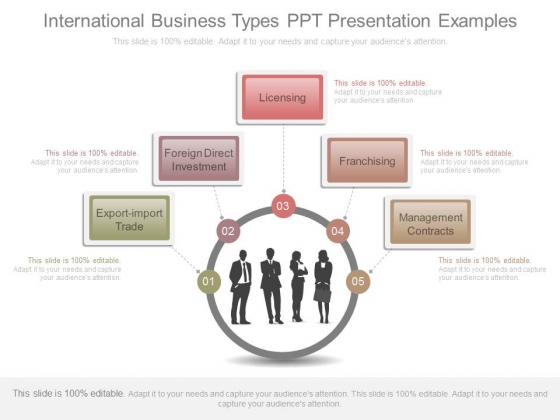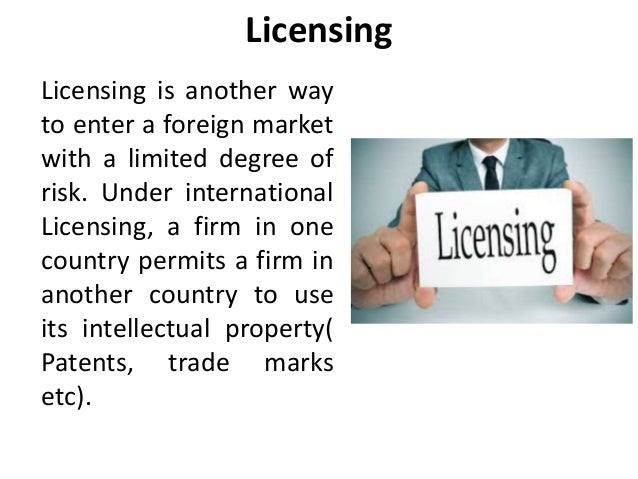In its most general sense licensing is a key mode of entry for firms considering international expansion. Some countries require you have an international business license to do business in their country.
 International Business Types Ppt Presentation Examples Powerpoint Templates
International Business Types Ppt Presentation Examples Powerpoint Templates
Licensing Business Model can be of two modes for any one be it a large company like Marvel Coke Calvin Klein etc.

Licensing in international business. Imports against Specific Import Licenses. Licensing affords new international entrants with a number of advantages. By licensing the domestic company need not bear any costs and risks of entering foreign markets on its own yet it is able to generate income from royalties.
The returns to licensor are comparatively low. The licensee will provide the majority of the infrastructure in most situations. Under international Licensing a firm in one country permits a firm in another country to use its intellectual property Patents trade marks etc.
Licensing is a rapid entry strategy allowing almost instant access to the market with the right partners lined up. Licensing represents a business arrangement in which one company gives another company or individual the permission to manufacture its product for a specific fee. A business which has developed a productservice with a trademark patent copyright or possibly trade secrets produce and sell the product or deliver the service.
It is mostly done by giving permission to the second party to use the name of the company and manufacture as well as sell its products. Manufacturing process brand name copyright trademark patent technology trade secret etc. Licensing is defined as a business arrangement wherein a company authorizes another company by issuing a license to temporarily access its intellectual property rights ie.
Open General Licensed Items While normal items and traded goods like textiles consumer durables Handicrafts electronics items Food articles Drugs etc are generally allowed to be imported and exported by all countries freely without restrictions. Licensing Licensing is another way to enter a foreign market with a limited degree of risk. A licensing agreement gives a foreign company the rights to produce andor sell another firms goods in their country.
Licenses may be exclusive exclusive for certain territories or uses or non-exclusive. Licensing is this a good business overseas. One gives the other special permissions such as using patents or copyrights in exchange for payment.
These licenses are usually non-exclusive which means they can be sold to multiple competing companies serving the same market. In this foreign market entry mode a licensor in the home country makes limited rights or resources available to the licensee in the host country. Licensing lets you instantly tap the existing production distribution and marketing systems that other companies may have spent decades building.
It can be a revenue in new markets but depends on good intellectual in the export market. A domestic company can license foreign firms to use the companys technology or products and distribute the companys product. Also if you wish to be a major shareholder in a company that has its headquarters in a country that requires an international business license you will need approval before having a stake in the company.
The organization that gives the access is licensor. Every country varies when it comes to. Under a licensing model a company sells licenses to other typically smaller companies to use intellectual property IP brand design or business programs.
For adequate consideration and under specified conditions. Licensing is a contractual arrangement whereby the firm the licensor offers proprietary assets to a foreign company the licensee in exchange for royalty fees. Licensing is low risk in terms of assets and capital investment.
The organization that obtains the access is the licensee. Licensing is an agreement between licensor and licensee wherein one organization gives the other organization access to its patents trade secrets or technology for a fee known as royalty. This is called MANUFACTURING UNDER LICENCE MUL.
A license is a contractual agreement to allow another company to use your intellectual property IP such as patents brands designs or know-how in exchange for a payment. The two basic modes are licensing out and licensing in. An international licensing agreement allows foreign firms either exclusively or non-exclusively to manufacture a proprietors product for a fixed term in a specific market.
Thats where licensing works. An international business licensing agreement involves two firms from different countries with the licensee receiving the rights or resources to manufacture in the foreign country. In return you get a percentage of the revenue.
Licensing international business transactions gives a licensee certain rights or resources to manufacture or market a certain product in a certain country often called the host country. Lets say you are unable to export to an overseas market due to complex rules and regulations or because the transportation cost is prohibitive. In licensing the company chooses another party of the host country to use its intellectual property in return for a licensing fee.
Licensing is a business agreement involving two companies. The agreement also may include production and sales in more than one country.